Search Posts
Recent Posts
- Our Networking Pick of the Week: North Kingstown Chamber at Tilted Barn June 16, 2025
- Business Beat: Residential Properties, Ltd (RPL) sales excellence celebrated at annual Top Producers Event June 16, 2025
- House Finance Committee’s FY 26 Budget boosts support for older Rhode Islanders – Herb Weiss June 16, 2025
- Business Monday: Employers need to learn how to “bust” ghostworking – Mary T. O’Sullivan June 16, 2025
- Rhode Island Weather for June 16, 2025 – Jack Donnelly June 16, 2025
Categories
Subscribe!
Thanks for subscribing! Please check your email for further instructions.

FDA approves new Pfizer, Moderna vaccines as COVID wave increases – Nick Landekic
by Nick Landekic, contributing
The U.S. Food and Drug Administration on Thursday approved the latest reformulated COVID vaccines, making it possible for people over 6 months of age to get additional protection in the midst of the ongoing and still increasing surge this summer of the virus.
What you need to know:
- What’s happening with COVID?
We are now in the fifth year of the COVID pandemic. Unfortunately, it is most definitely not over. The virus will be with us for the foreseeable future.
We don’t see as much in the news about COVID in part because politicians have decided to not talk about an unpleasant topic during an election year. This trades our health for votes.
Because of the increasing transmissibility of the latest variants – and, unfortunately, the decline in people taking public health precautions such as vaccinations and masking – we have been experiencing a major surge this summer. The most widely used indicator of COVID activity now is measuring the virus in wastewater. This shows that 44 states currently have high or very high levels of COVID, including Rhode Island.
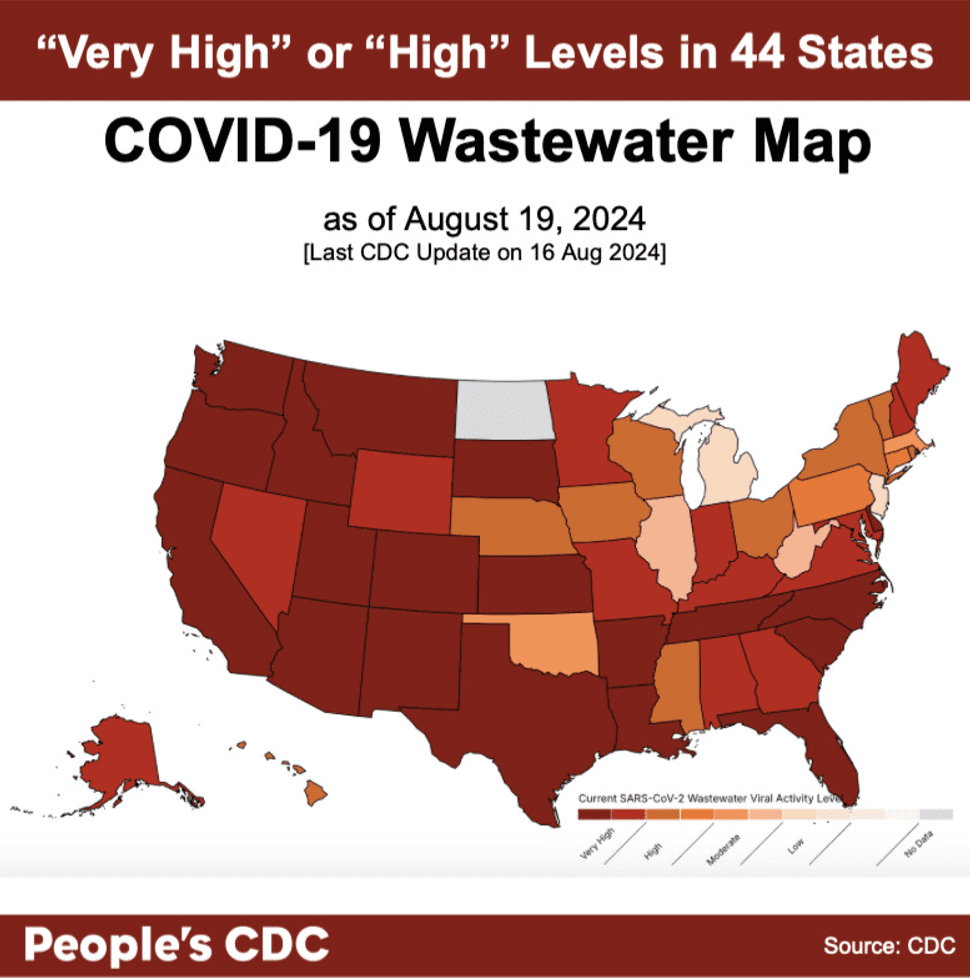
Across the country COVID levels are the highest they have been in at least two years, since the Omicron surge, and still increasing. Hospitalizations and reported emergency room admissions for COVID are also still increasing.
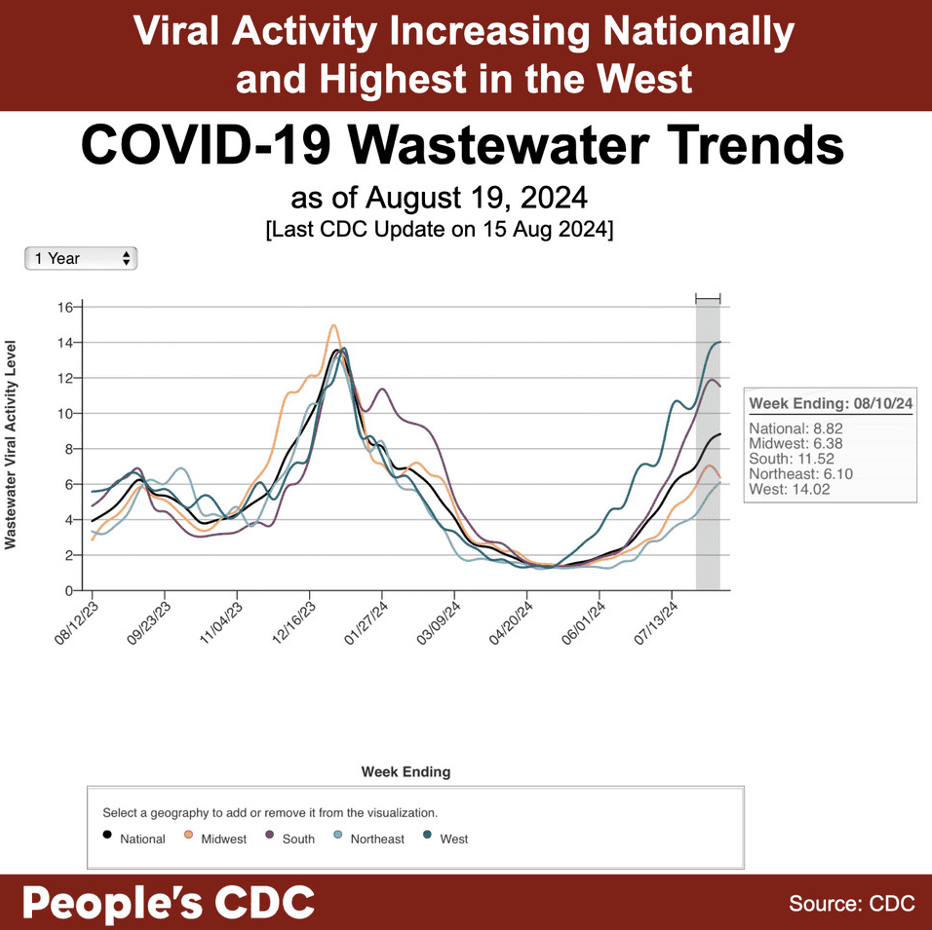
Anyway you look at it, there’s a lot of virus out there. All the ‘bad colds’ and ‘flus’ people have commented on having this summer have almost certainly been COVID.
- How dangerous is COVID now?
Contrary to myths that may sometimes be widely disseminated, the COVID virus is as dangerous as ever, if not even more so. Vaccination or having antibodies from a recent infection can sometimes provide short-term protection and make a new reinfection less severe. However, new variants often can evade antibodies from prior infections. While prior infection can give partial immunity to some but for others causes long term damage to the immune system increasing risk from future infections.
The only evolutionary pressure on the virus is to spread more efficiently. There are no forces acting to make it less severe, except that some traits which make the virus more easily transmissible or immune evasive can also result in greater virulence. Viruses rarely become ‘milder.’
Repeat infections do not get easier but more severe with 2-3 times greater risk of damaging your body with each subsequent infection. COVID is not something you want to keep getting again and again.
The older you are, the greater the risk from COVID. Compared with the flu COVID is much more serious and causes more deaths in anyone over age 15, and dramatically more dangerous for those over 50.
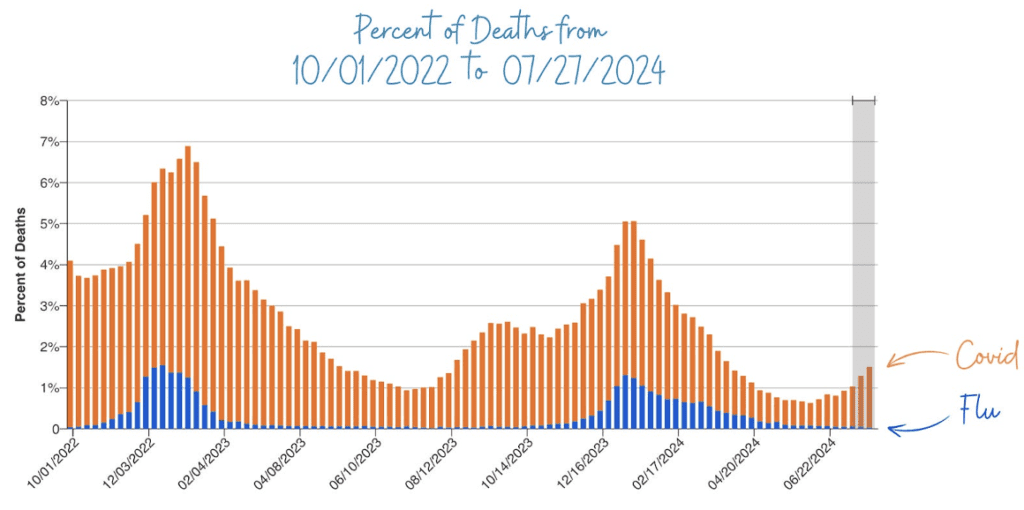
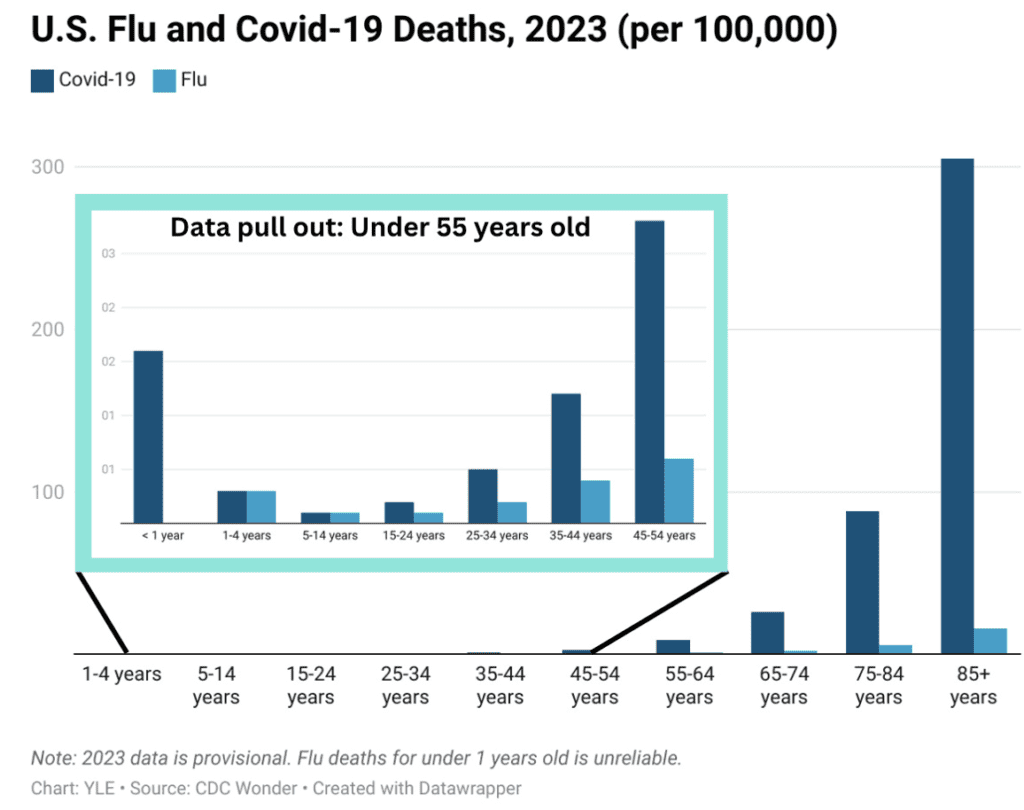
- What about Long COVID?
We continue to learn a great deal about COVID, including the long term effects. Being infected is more than just the acute phase – COVID can have many long term health impacts, including tiring easily, cognitive and memory impairment, brain damage, heart problems, impaired learning in children, digestive problems including Irritable Bowel Syndrome, blood clots, lung damage, increased risk of diabetes, and mental illnesses.
Many studies have shown that between 10% and 30% of people who are infected with COVID go on to have prolonged ongoing Long COVID health problems.
A major recent study found that in people over 65 who have COVID, an astonishing 65% – 2/3 – go on to develop new cognitive impairment. This has raised the specter of a potential wave of a huge number of new dementia patients needing medical care in coming years.
- Why do we need a new vaccine?
The virus continues to mutate rapidly, with a continuous stream of new variants emerging. The forces of evolution mean the successive variants are generally more transmissible – more easily caught – and more evasive of antibodies from either prior vaccinations or infection.
Protection from vaccines also does not last forever. Most vaccines, including COVID and flu, provide protection for a few months, enough to get through a surge or a season.
These are the same things that happen with the flu and is why it’s important to continually update vaccines to better target the circulating variants and restore protection that has waned since your last vaccination.
The predominant COVID viral variant currently circulating is termed K.P.3.1.1. The two updated vaccines just approved were designed to target the K.P. family of variants and thus should provide better protection than last year’s vaccine.
A third updated COVID vaccine from Novavax is expected to be approved sometime later this year.
- Who is eligible to get the new vaccines?
The FDA approved the updated Pfizer and Moderna COVID vaccines for anyone over the age of 6.
- When should I get the new vaccine?
The FDA approval allows anyone over age 6 months to get the new vaccine as long as it has been at least two months since your last vaccination.
As always, you should talk with your doctor to figure out what the best timing may be for you personally to receive the new vaccine.
Some guidance from Katelyn Jetelina, renowned scientist and author of the “Your Local Epidemiologist” newsletter, suggests if you have recently been infected to wait 4-6 months before getting vaccinated. It doesn’t hurt if you get it earlier, but some research shows that waiting allows our antibody factories to update more effectively.
If you have not been recently infected rely on your doctor’s advice when to get the new vaccination. Dr. Jetelina suggests considering:
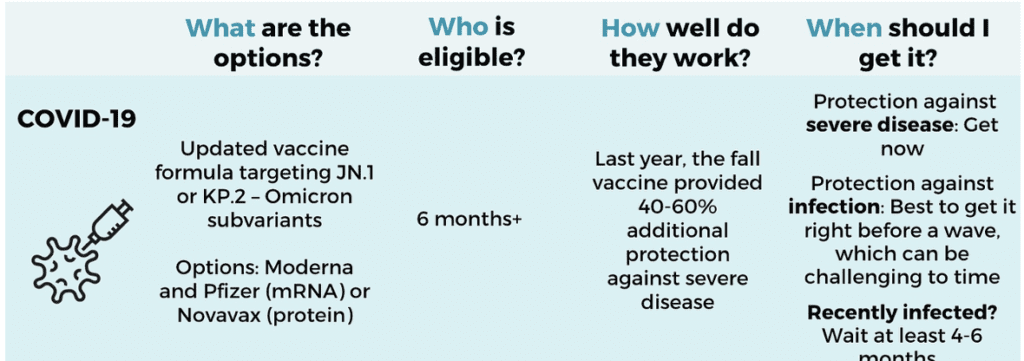
If you are older, or have any health issues that could predispose you to a poor outcome from having COVID – such as hypertension, diabetes, obesity, are immune compromised, or are over 50 – it’s especially important to consider getting a COVID vaccine booster shot. Talk with your doctor about when the best time would be for you.
COVID will be with us for a very long time. Living with COVID doesn’t mean ignoring it but being aware of it and taking sensible, appropriate precautions. Fortunately we’ve learned a great deal about the virus since it first appeared. We now have tools to help keep us healthy: the latest updated vaccines to reduce the risk of serious illness or infection, Paxlovid if you become infected, and wearing a N95 mask in crowded indoor settings or when traveling during times of high transmission – such as this summer. Stay informed about what’s happening with information resources such as The People’s CDC.
Take advantage of these and stay healthy to enjoy the rest of the glorious New England summer, and spectacular fall to come.
Editor’s Note: U.S. health officials said on Friday that the government’s free COVID-19 test delivery programs would reopen in late September, in time for the holiday season, and they are launching an educational campaign to target those at risk of severe disease.
—————-
Nick Landekic of Bristol is a retired scientist and biotechnology entrepreneur who has spent more than 35 years working in the pharmaceutical industry. Read Nick’s articles on COVID here: https://rinewstoday.com/?s=Nick+Landekic
